Israel
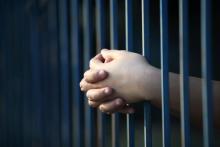
While they told Moses that, “All the words that the Lord has spoken we will do” (Exodus 24:3), in the end they turned to idols and broke God’s laws. By the time we get to First Samuel, we hear the people clamoring for an earthly king so they could be like other nations (1 Samuel 8:4-22). They thought life would be better if they shook up their system of government, so they ditched the judges and looked for an outsider. In the end, they got exactly what they asked for – a king named Saul who was wicked and moody and paranoid.

On Feb. 8, Guadalupe Garcia de Rayos went to Mass and said a prayer before voluntarily going to her biannual appointment at the immigration office in Phoenix.
Guadalupe knew that, because of President Trump’s executive order on immigration enforcement, she was now considered a high priority for deportation and could be sent back to Mexico, leaving her two teenage children, both of them U.S. citizens.
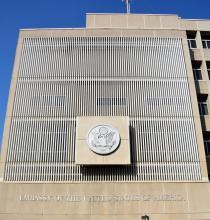
It wasn’t long ago that Rubio and Cruz criticized the Obama administration for the deaths of four Americans, including Chris Stevens, the U.S. ambassador to Libya, in a terrorist attack on a U.S. consulate in Benghazi.
“Congress and the Executive Branch need to work together to do everything possible to make sure something like this does not happen again,” said Rubio in June 2016.
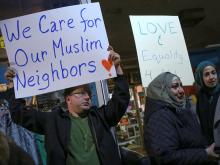
The American Civil Liberties Union collected more than $11 million and 150,000 new members. The Southern Poverty Law Center’s Twitter account gained 9,000 followers. And the Anti-Defamation League, which fights anti-Semitism and other bigotries, saw donations increase fiftyfold.
In the days since Donald Trump won the presidency, these spikes, in support for groups that defend religious and other minorities, speak to a fear that the president-elect will trample on their rights — or at least empower those who would.
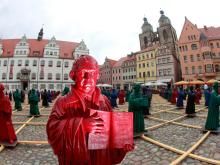
Tackling a delicate issue, as it begins its yearlong celebration of the Reformation’s 500th anniversary, Germany’s main Protestant church has officially renounced its mission to convert Jews to Christianity.
In practice, the Evangelical Church in Germany (EKD), made up of 20 regional Lutheran, Reformed, and United churches, mostly gave up efforts to convert Jews in the decades after the Holocaust, and closing that chapter should have been a formality.
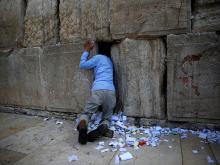
Hoping for divine intervention – or Jewish votes – Donald Trump wrote a short prayer to be inserted in between the stones of the Western Wall.
Trump’s team photographed and sent a copy of the handwritten prayer to Ynet News and Yedioth Ahronoth, Israeli sister publications. The original was handed to David Faiman, a Trump advisor, who was heading to Israel, the news outlets reported.
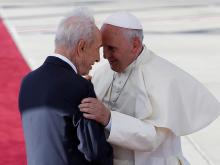
Peres, who was 93, was the last major surviving founder of Israel, and evolved from a hawkish defender of the Jewish state to a champion of the two-state solution in which Israelis and Palestinians would co-exist in peace.
Religious leaders remember him for reaching out to people he once considered his enemies.
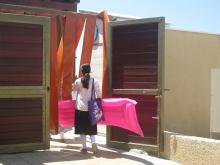
While some European beaches are banning women dressed in “burkinis” and other modest swimwear, and Americans are challenging women’s-only swimming hours at public pools, this Israeli beach has long been a haven for women whose strict religious beliefs, community norms or fears of sexual harassment, among other reasons, make swimming or sunbathing alongside men undesirable, even impossible.

The 2016 Democratic National Convention party platform includes much that religious progressives from multiple faith backgrounds might like. Approved July 25, it calls for expanding LGBT rights, combating climate change, and narrowing the income gap. Here are some of the hot-button social proposals.

Elie Wiesel’s death is inspiring an outpouring of grief and gratitude from leaders in the religious and political worlds, and ordinary people alike.

Stuart Levy, a nurse at a Jerusalem hospital, updates his ward’s work schedule several times a week, with staffers’ vacations, birthdays and more religious holidays than many people know exist.
“We have 18 hospital beds, and on any given day we may have an Orthodox Jew next to a devout Muslim next to a Catholic next to a Druze next to a Russian Orthodox patient,” said Levy, head nurse of the oncology/hematology ward at Hadassah Medical Center-Ein Kerem. “And many of our staff are religiously observant.”

A nearly 900-year-old synagogue recently held its first Sabbath service in decades in one of the diaspora’s farthest flung places: the coastal Indian city of Cochin.
Congregants came from four continents for what could be the last such observance in a region whose once-thriving Jewish communities have mostly migrated to Israel.

On the eve of her religious denomination’s quadrennial meeting, Hillary Clinton wrote a letter to Jewish agency heads saying she opposes the Boycott, Divestment, and Sanction movement targeting Israel, which the meeting will consider.
“I believe that BDS seeks to punish Israel and dictate how the Israelis and Palestinians should resolve the core issues of their conflict. This is not the path to peace,” Clinton wrote in a letter May 9 to David Sherman, chair of the Israel Action Network, and Susan K. Stern, vice chair of the Jewish Federations of North America.
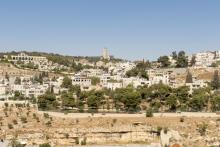
THE ROAD WAS bumpy—full of deep holes and harrowing possibilities for slippage down a roadside slope. My heart raced as I considered the possible headline back home: Bus tumbles down Israeli slope—50 Americans killed by Palestinians. Yes, that would likely be the headline, but it wouldn’t tell the story.
As our bus rolled through this stretch southwest of Bethlehem, my heart raced as Amal Nassar explained that the area had been declared property of the Israeli state decades ago. Since then, Israel built smooth roads, but we weren’t allowed on them. To the right of our bouncing bus was an adjacent highway reserved for Israelis—Palestinians are restricted from driving on these Israeli highways, relegated to the old dirt roads.
Our bus wound around sharp corners, up a hill until it came to a stop. There didn’t seem to be any building structures in sight so I wondered why we’d stopped. Nassar explained that the Israeli government had set large boulders in the middle of the road to block traffic from reaching her family’s farm, so we would have to hike the rest of the way.
We stepped off the bus and onto a dirt road strewn with rocks and trash—old tires, plastic bags, plastic bottles. When the Israeli government claimed the land, it ceased basic services such as trash pick-up, electricity, and running water to Palestinians in the area. It was an effort to make life so difficult that the Palestinians would choose to leave—in modern human rights terms, the world calls this ethnic cleansing. Nassar explained that many families have chosen to leave. Once they are gone for three years, the Israeli government claims that their property has been abandoned and that the state then has legal grounds to claim the power of eminent domain over the land.
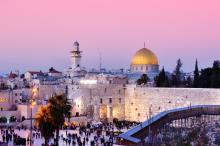
The largest gathering of Muslim leaders in the world kicks off a five-day conference that will call for a new peace process to end the Israeli-Palestinian conflict. Other weighty issues at the Organization of Islamic Cooperation summit include combatting extremism within Muslim nations, countering Islamophobia in the rest of the world, and protecting the Rohingya — a group of Muslims suffering persecution in Myanmar.


Sometimes it takes a friend to tell you that you’re an idiot. Actually, Anat was kinder than that — in keeping with rabbinic teaching that reproof needs to be done for the benefit of the admonished rather than the admonisher (which is harder than it seems, given the feel-good buzz of self-righteousness).
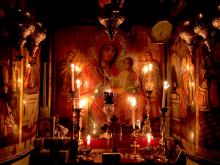
I weaved my way past, trying to find the right angle. All I wanted was to get a good look at the image of Christ Pantocrator — that is, Almighty — that crowns the inside of the dome at the center of the church. But there were too many walls and too many obstructions. No matter where I stood, every view was partly blocked. No matter what I did, I could never quite see all of Jesus.
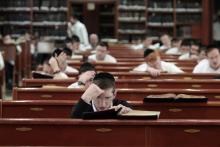
“Mostly what we find is a huge gulf between ultra-Orthodox and secular Jews,” said Neha Sahgal, a senior researcher on the survey, “Israel’s Religiously Divided Society,” which is based on face-to-face interviews of more than 5,600 Israeli Jews, Muslims, Christians and Druze.
Secular Israeli Jews, for example, say they are more uncomfortable with the idea of their child marrying a very Orthodox Jew than a Christian, the report shows.
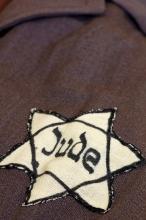
“Contaminated by the monstrous and rooted ‘certitude’ that in this catastrophic and absurd world there exists a people chosen by God … the Jews endlessly scratch their own wound to keep it bleeding, to make it incurable, and they show it to the world as if it were a banner,” read Daniel Jonah Goldhagen, at a Georgetown University conference Feb. 29 on anti-Semitism in Europe.
“Now, if I told you that these were the words of a Hamas leader, or any number of Middle Eastern political officials, or movement leaders, you wouldn’t be very surprised,” he said.
“But these were the words of Jose Saramago, the Nobel Prize-winning author, as published in 2002 in El Pais, the paper of record of Spain.”